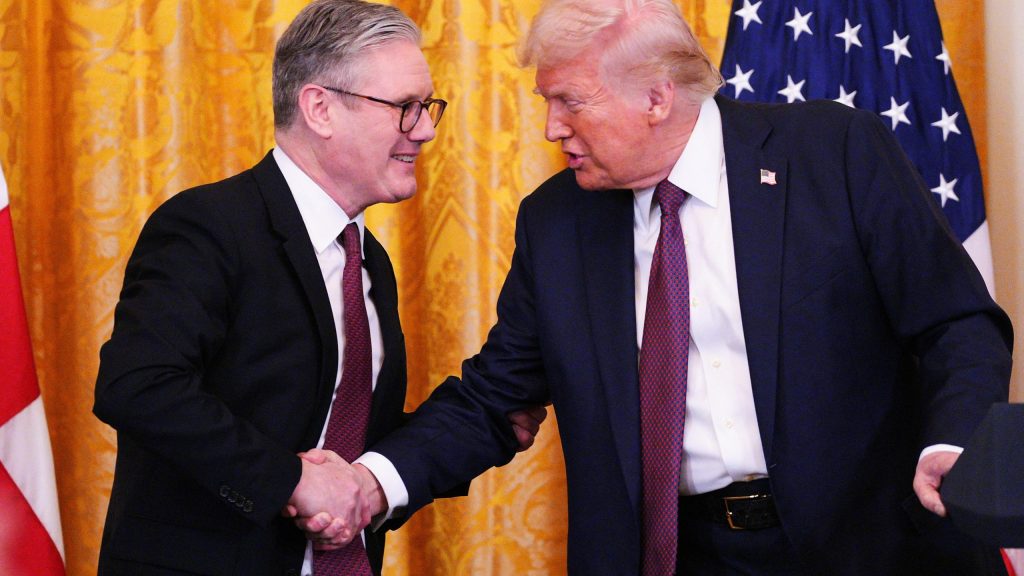Pharma, Autos, Film in Firing Line as Trump Rethinks UK Trade Terms

Prime Minister Keir Starmer’s hopes for a stable UK-U.S. trade relationship have been rattled by a series of new tariff threats from President Trump. Just months after the two leaders agreed to lower trade barriers, Trump’s protectionist rhetoric is putting sectors like pharmaceuticals, automotive, and film under pressure.
“I think it was a better deal for you than us, but these are minor details,”
Trump said during a state visit to the UK earlier this month, marked by a grand royal procession and military fanfare.
That deal had reduced tariffs on British car exports to 10 percent, but left key areas — such as steel and aluminium — unresolved. Now, Trump is threatening 100 percent tariffs on imported pharmaceuticals unless firms are building U.S. manufacturing plants.
While EU pharma tariffs are reportedly capped at 15 percent, the UK’s agreement only promises “preferential treatment” if American companies get better conditions in Britain — particularly regarding the NHS’s pricing regulator, NICE.
Trump has decried what he called the unfair treatment of American patients — who pay more for drugs than those abroad — writing a letter to major pharmaceutical companies, demanding price cuts in line with “most favoured nation” rates.
UK pharma giants GSK and AstraZeneca have responded quickly: both have major U.S. investments underway, potentially exempting them.
Since they are either “breaking ground” or have manufacturing facilities already “under construction” — terms Trump explicitly defined when clarifying who would qualify for exemptions — these British pharmaceutical giants seem to be exempt under these terms.
“It looks like some of the bigger companies [in Britain] might be okay, subject to where they are with their building,” said former trade adviser Allie Renison.
The White House has paused implementation of the tariffs to allow further negotiations, but conditions remain uncertain.
“The impact of Trump’s tariff threats on British pharmaceutical giants like AstraZeneca and GSK needs to be seen in the much wider picture of U.S. demands given conditionality on agreeing tariffs and exemption for firms building U.S. sites,” said Mark Dayan of the Nuffield Trust.
“For the U.K., this is bound up in the requirements in the Economic Prosperity Deal.”
Science Minister Patrick Vallance warned that the UK might need to spend more on medicines to stay competitive.
“There is a question of how much money the NHS can put into this, how much goes on price,” he said, adding that tariffs could make things worse without UK concessions.
At the Labour Party conference, Trade Secretary Peter Kyle described pharma firms as
“hard negotiators, [who] know how to use the media and the press to do it.” He added: “We are tough negotiators too.”
Starmer’s business adviser Varun Chandra flew to Washington this week, reportedly to explore a compromise — potentially increased NHS drug spending to avoid tariffs.
“This is more sensitive than hormone-treated beef frankly,” said Renison.
“I think the government probably needs to be careful about being seen to connect the dots between U.S. pressures in this space and saying there’s a rationale for increasing the amount the NHS has to pay for it.”
Trump also threatened a 25 percent tariff on imported heavy trucks.
When it comes to the new tariff policy “there’s quite a lot of unknowns with this,” said a U.K. auto industry representative, pointing to the fact that “it’s just a post on Truth Social” at the moment without an executive order from the White House or initiation of an investigation by the U.S. Trade Representative’s Office.
“Businesses need as much certainty as possible on tariffs,” said William Bain of the British Chambers of Commerce.
Furniture and lumber tariffs are also back on the table, though the UK appears shielded under the May deal, which caps duties at 10 percent. The film industry may not be so advantaged.
The president has also decided to revive an earlier bugbear, vowing to impose yet another 100 percent flat tariff on “any and all movies that are made outside of the United States.”
“Our movie making business has been stolen from the United States of America, by other countries, just like stealing ‘candy from a baby,’” he wrote on Truth Social earlier this week.
Paul Fleming, general secretary of Equity, said: “We saw some delays in investment when President Trump last raised this threat, but there is a pipeline of work in the U.K. which will benefit both Hollywood and U.K. studios.”
While calling the threat “erratic,” he warned it was creating “an unhelpful level of uncertainty” during contract negotiations.
With trade talks now tied to U.S. election-year politics, the UK faces growing pressure to defend its industries without making politically explosive concessions — particularly on NHS spending.
